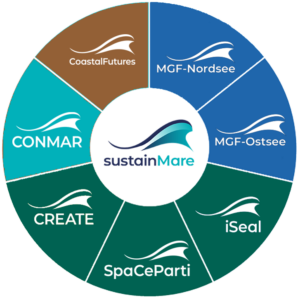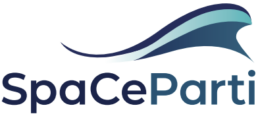sustainMare research mission of the German Marine Research Alliance
 Oceans and coastal areas are used as a source of food, energy and raw materials, as a transport route and for tourism. At the same time, the oceans are subject to massive climatological pressures due to global warming and rising sea levels.
Oceans and coastal areas are used as a source of food, energy and raw materials, as a transport route and for tourism. At the same time, the oceans are subject to massive climatological pressures due to global warming and rising sea levels.
These uses cause pollution in the sea and on the coast: noise, pollution, consumption and damage to the seabed, changes to natural currents. Added to this is man-made climate change with rising temperatures and changes in weather patterns. How will these pressures continue to develop and combine with each other? And how will our sea react to this?
This mission focuses on regions in the North and Baltic Seas. The following potential influencing factors are taken into account:
Eutrophication, fisheries, shipping, pollution (including plastics, other flotsam and chemicals), tourism, energy production, mining of mineral resources, dredging and sedimentation, coastal protection measures and other direct economic pressures.
The results of the seven collaborative projects with a total of 28 research institutions aim to identify options for action for the sustainable use of marine resources and ecosystem services and to promote good environmental status in marine systems. The utilisation of the results in politics and society is also ensured through measures for knowledge transfer and data provision.
Effective concepts for the public welfare-orientated, prosperity-securing and environmentally friendly use of marine and coastal areas as well as protection concepts for the preservation of biodiversity and natural biotopes are absolutely essential and of great social importance.
To achieve this, a transdisciplinary and interdisciplinary approach and close dialogue with stakeholders are required.
sustainMare finds answers and identifies options for action!
Further information on the research mission can be found here.
SpaCeParti:
Coastal Fishery, Biodiversity, Spatial Use and Climate Change:
A Participative Approach to navigate the Western Baltic Sea into a Sustainable Future
Coastal fisheries in the Western Baltic Sea are under great pressure, with unforeseeable consequences for the economic development of the associated coastal communities. Anthropogenic influences such as overfishing of cod and herring, eutrophication of the Baltic Sea as well as climate change are major contributors. In addition, fisheries increasingly suffer from spatial conflicts for instance with necessary nature reserves to preserve biodiversity and wind farms to mitigate climate change.
On land, growing tourism is taking up more and more space on the coasts, which can lead to displacement of commercial fishers by recreational fisherboats.
Solution approach living labs
In living labs, science and society meet and jointly seek solutions for sustainable development of Baltic Sea fisheries. This transdisciplinary collaboration is key to sustainable developments because they are jointly conceived, developed, tested and reflected upon by different stakeholders in society.

-
Options to prevent the economic collapse of the Western Baltic small scale fisheries and the resulting socio-cultural consequences.
-
Ideas for the transformation of small scale fisheries from an endangered economic entity to a sustainable socio-ecological economic form.
-
Development of sustainable solutions to the multiple conflicts between user and interest groups and civil society.
Contribution to closing current knowledge gaps
The practical relevance in the real labs is linked to 5 research work packages. In this way, current knowledge is made practically usable, new knowledge is generated and supplemented through international cooperation.
The broad range of topics includes understanding the functioning of the Baltic Sea ecosystem and its biodiversity, especially with regard to the fish species cod and herring. In socio-economic analyses, political processes and pressures on fisheries are examined. Various future scenarios are created for both the development of the fish population and the development of fisheries, which provide a basis for better fisheries management.
An assessment of the processes concerning the fisheries of the Western Baltic Sea will be carried out in order to develop action proposals for policy, in which options for a sustainable future of fisheries will be identified.





